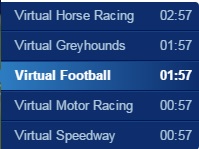There is no doubt that of all the different Virtual Sports available to bet on  nowadays at a number of different bookmakers, Virtual Football is one of the most popular. With soccer the most popular sport in the world today, and given that football betting is one of the two biggest betting markets when it comes to traditional sports betting, it stands to reason that in the Virtual world, Virtual Football is going to be a big draw for punters.
nowadays at a number of different bookmakers, Virtual Football is one of the most popular. With soccer the most popular sport in the world today, and given that football betting is one of the two biggest betting markets when it comes to traditional sports betting, it stands to reason that in the Virtual world, Virtual Football is going to be a big draw for punters.
However, for many bookmakers their Virtual Football service offers something quite different to real world football betting. In the real world, all football games (apart from the meaningless pre-season friendlies) tend to take place as part of one competition or another. That can be a domestic league based tournament, such as the Bundesliga, Premier League or Serie A, or it can be a domestic cup, such as the FA Cup, Copa del Rey or DFB Pokal, or it can be an international tournament, such as the Champions League, or for international teams, the World Cup or European Championships.
In the Virtual world however, for the vast majority of providers, their Virtual Soccer betting service simply produces a matchup between two randomly selected teams. Sure, the game may reference each game as being part of a ‘league’ or ‘cup’ but in actual fact, the matches are selected at random and the results they generate serve no other purpose than to finalise the results of the game for the purposes of resolving the betting. There is no contextual element to the game. The name of the tournament is simply a way to sort games between teams of different types. The games serve no relation to the tournament they are being contested in.
For many football fans, this is one of the most disappointing aspects of Virtual Football as there is nothing for them to reference from when making a bet. Part of the excitement of betting on football in real life is that punters can, if they so wish, perform a little research about the game and through that formulate an idea of what bet will be a best value option for that game. You cannot do that in Virtual Football as it stands as there is no data available for the teams for punters to use.
However, all that could be about to change.
Virtual Football Tournaments – Explained
In truth, Virtual Football Tournaments have been mooted for a while now and some providers have already started experimenting with different tournaments with some success. Unfortunately for customers in the UK, many of these types of Virtual Sports are either unavailable or hard to find, but each tends to operate in a very similar way.
some providers have already started experimenting with different tournaments with some success. Unfortunately for customers in the UK, many of these types of Virtual Sports are either unavailable or hard to find, but each tends to operate in a very similar way.
In a Virtual Football Tournament, rather than simply selecting one match to play at random, the software will instead play through matches that are part of a tournament. This can be a league, or it can also be a cup tournament. Games can feature club teams from one nation, club teams from several nations or international teams depending on the tournament.
What happens then is that each game in the Virtual Tournament is played out and players can bet on these Virtual Football games as they do the standard games. However, in the Virtual Tournament, these games have a relevance. If it is in a league for example, then a team will be awarded three points for a win, or one for a draw. If it is a cup competition, then the team will either win and progress into the next round, or lose and be knocked out of the competition.
The massive difference between Virtual Football and a Virtual Football Tournament is that the games in a tournament generate their own data, just as real-life football generates its own league tables, and progress in a cup competition. This additional layer of data not only provides a context for the games being played (and makes it more realistic), but it also adds a greater level of complexity and detail to the game, as well as providing data for punters to use when formulating what bets they want to make on the next game.
There is also the fact that by creating this additional data alongside the results of each individual game, there is additional potential for further betting markets on Virtual Soccer. For example, if a tournament was a Virtual League, you could bet on which team would win the league at the end of the season, or which teams would be relegated, or which teams would earn a place in European competition. In cup competitions, you could back teams to win the tournament, or at least reach the final. These markets are currently not available on standard Virtual Football betting at present but with the new tournament-based games, could well be made available.
This week Golden Race, a virtual sports provider has launched its latest virtual football game which is based on the Copa Libertadores, South American’ football’s version of the UEFA Champions League. The game, which is in addition to its Virtual European Championships and Virtual World Cup games (all of which are tournament-based virtual sports) has an initial group phase of 32 clubs (in eight groups of four) followed by a knockout phase which features the top two teams in each group qualifying.
The product is aimed at customers in Spain and Latin America and features a total of 20 betting markets on each of the games, as well as a statistical presentation prior to the game which outlines the key statistical data for each of the teams.
total of 20 betting markets on each of the games, as well as a statistical presentation prior to the game which outlines the key statistical data for each of the teams.
Of course, developing such a game shows how Virtual Football can be developed for future releases but it does not come problem-free. If a company wants to use, say Premier League data, then licenses for this need to obtained and that costs money. Furthermore, companies would have to figure out a way to present this additional data to punters so that it is accessible and interesting, rather than overwhelming.
However, as companies around the world have shown, making context-rich Virtual Football tournament games is very possible and hopefully, we will soon see similar games ready for release across the top betting sites, rather than in niche markets around the world, sometime soon.
